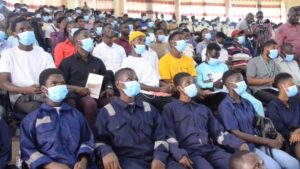The Petroleum Commission is to set-up a Welding and Pipe fitting Centre at the Takoradi Technical University (TTU) to train welders to be professional for the oil and gas industry.
This, will be under the Ghana Welding Bureau (GWB), and it is expected that welders from the centre will be able to meet international standard – requirement in the industry.
Also, it forms part of efforts to enhance the country’s local content participation, and to train Ghanaians for available jobs in the upstream oil and gas sector through the Accelerated Oil and Gas Capacity (AOGC) Programme.
Under the AOGC Programme, five welding trainees, who were selected to study Advanced Welding at the Northern Alberta Institute of Technology (NAIT) in Canada, have successfully completed the course and graduated with a Canadian Welding Bureau (CWB) Level 1 Welding Inspector Certification. Currently, they are working in Ghana as welding instructors in three technical institutes and one university.
The training for the five welders was sponsored by Baker Hughes (Ghana), and was valued at US$250,000. Additionally, eight instructors/lecturers were selected from technical institutions and universities across Ghana and are currently undergoing a 10-month training on Becoming a Master Instructor (BMI) at the NAIT in Canada. They will graduate with certifications to teach pipefitting, welding and millwright/mechanical engineering at the technician level.
Egbert Faibille Jnr., Chief Executive Officer of the Petroleum Commission, disclosed this at the Ghana Welding Bureau (GWB) Consultative Forum for welders, and some students at the TTU and the Takoradi Technical Institute (TTI).
He noted that there is deficiency in the welding sector in the country, and that some welders in the country do not have certificates to meet international standards. “Welding should be of high integrity so that there will be no accident, and that is the basis incorporated in the Ghana Welding Bureau.
“A critical vocation like welding should be taken seriously; welding offshore requires awareness on Health Safety and Environment (HSE),” he said.
According to him, “It is about time we changed the narrative and brought pipe fitting as a course in the Technical Institute”.
Faibille lamented that the country lacks a professional body to regulate the welding industry, hence, the need for establishing the Ghana Welding Bureau (GWB).
He explained that the GWB is mandated, among other things, to provide regulatory direction and certification for the welding vocation in line with international best and acceptable practices.
He mentioned that the PC is facilitating for Ghanaian welders to join the Ghana Welding Bureau, and expressed hope that such an initiative will help many Ghanaians in the welding industry to qualify for jobs in the oil and gas sector, since activities in the sector are highly regulated and certified.
Dr. Paul Frimpong, a Consultant for the PC, explained that the GWB is a non-profit, non-governmental body responsible for the certification and registration of companies and individuals involved in welding and allied operations.
He explained the benefits of becoming a member of the GWB, and encouraged individual welders and students to register and become members of the GWB to benefit from opportunities in the industry.











